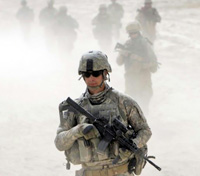U.S. again Builds Up its Military Presence in Afghanistan
US President Barack Obama is set to unveil his new Afghan strategy, with an expected commitment to send thousands more troops to fight the Taliban. Some world authorities intend to join him in his plan.

Mr Obama has already briefed military and foreign leaders on the deployment, reportedly of 30,000 additional troops.
The US currently has about 68,000 troops in Afghanistan, with foreign forces overall totalling more than 100,000.
Mr Obama's announcement comes amid growing domestic concern over the Afghan war.
Both the rise in foreign troop deaths and the chaos that followed August's general election in Afghanistan have exacerbated fears over whether America has an exit strategy for the conflict.
Earlier this year, however, the US military commander in Afghanistan, Gen Stanley McChrystal, warned that America risked failure in Afghanistan unless troop numbers were increased. He requested 40,000 more soldiers, but Mr Obama is expected to order 10 000 less.
The plan is expected to focus on securing cities and on training Afghan security forces to assume more responsibility.
The president is not expected to give a target date for pulling out of Afghanistan, but according to White House insider, America's commitment was "not open-ended".
"We are there to partner with the Afghans, to train the Afghan national security forces, the army and the police, so that they can provide security for their country and wage a battle against an unpopular insurgency," the White House spokesman Robert Gibbs said.
Mr Obama was said to have held telephone talks on Monday with the leaders of several nations who have troops in Afghanistan to discuss his plan.
On Monday, Britain confirmed it was sending a further 500 soldiers to Afghanistan, taking the country's total deployment in the country to 10,000.
The prime minister told parliament that "the safety of people on the streets of Britain" depended on the UK taking action to address the militant threat from al-Qaeda at its source - along the Afghan/Pakistan border areas. "We should be failing in our duty if we didn't work with our allies to deal with the problem where it starts," he said.
The BBC News has contributed to the report.
Subscribe to Pravda.Ru Telegram channel, Facebook, RSS!





